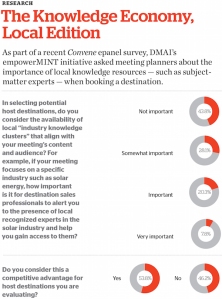Yesterday, SKIFT’s Greg Oates (@gregoates) wrote a very insightful article about what could make meeting destinations attractive to decision-makers in the future. Every destination marketer should grab a cup of coffee and give this article some thought.
 Citing a North American study collaboration by DMAI and PCMA’s Convene magazine, Mr. Oates presents the perspective that a destination’s “intellectual capital” is a growing competitive advantage and that it will rival the typical meeting infrastructure elements most often showcased by destination marketers as reasons for planners to pay attention.
Citing a North American study collaboration by DMAI and PCMA’s Convene magazine, Mr. Oates presents the perspective that a destination’s “intellectual capital” is a growing competitive advantage and that it will rival the typical meeting infrastructure elements most often showcased by destination marketers as reasons for planners to pay attention.
While the study suggests fewer than 30% of respondents saw a destination’s intellectual capital as important-very important, it’s definitely trending on association planner radar screens and bears consideration by destination marketers when crafting their pitches.
Where does this trend go from here? I think it depends on how the meeting industry’s age old identity tension (hospitality experience vs. economic development platform) evolves and reconciles. On one hand there continue to be signals (see the 2015 DMAI-Tourism Economics Report) that the meetings industry’s value proposition is increasingly around community economic development. Through the work of meeting industry organizations and the Meetings Mean Business coalition, governments and community leaders are starting to pay attention.
On the other hand, DMOs continue to market their respective meetings value propositions around hospitality elements like the size of their convention centers and the number of Michelin chefs they have on site.
While there are no details about the profile of those respondents that saw intellectual capital as important-very important when making a destination selection, these are the groups that I would want in my community. They are probably looking at the destination through a different lens than hospitality – perhaps for investment purposes or even workforce development. Because their perspective on the destination’s value proposition is different, they are more likely to engage with a broad cross-section of the destination community’s socio-economic stakeholders, bringing the impact of the event well-beyond the venue. And if the destination experience is positive they’ll probably share it with other thought-leaders who have a similar mindset about the strategic role of meetings and events. As a result, their destination legacy from the meeting/event will not only be around traditional hospitality metrics but about how a meeting made a difference for the organization as an enterprise and the destination’s broader community of stakeholders.
And isn’t that what destination marketing success ultimately needs to look like?
Got get ‘em.
